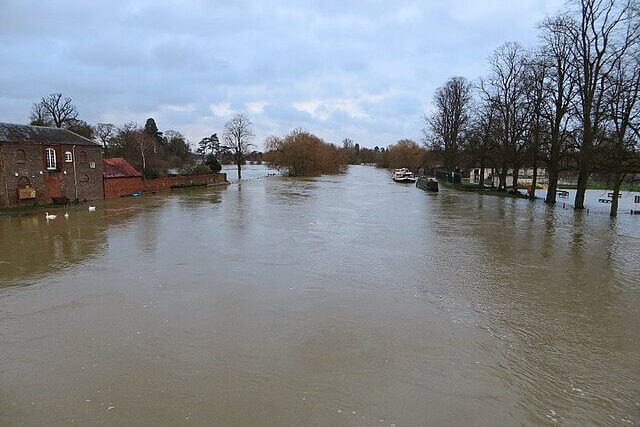
Over 4,000 crucial flood defences in England are in such a state of disrepair that they are nearly ineffective, with close to 800 critical assets deemed to be in “poor” or “very poor” condition.
This includes hundreds in areas recently ravaged by Storm Babet. The analysis, based on Environment Agency data obtained by Greenpeace UK’s investigative arm, Unearthed, reveals the vulnerability of these defences, particularly in the ten English counties most severely impacted by the historic downpours associated with Storm Babet.
Of the 4,204 flood defences assessed in 2022, about one in 15 were found to be in poor or very poor condition. A concerning 856 were classified as very poor, indicating “severe defects resulting in complete performance failure,” rendering them essentially useless. The remaining 3,348 were considered poor, with defects that would “significantly reduce” their effectiveness.
Steve Reed, Labour’s shadow environment secretary, said: “The Conservatives’ sticking-plaster approach to flooding has left communities devastated and cost the economy billions of pounds.”
In the regions hit hardest by Storm Babet, spanning from Suffolk to Northumberland, 646 flood defences were in poor condition, and 135 were categorised as very poor. The Environment Agency, responsible for more than half of England’s flood defences, reported a slight improvement in inspections from the latest financial year, indicating that one in 20 defences were in disrepair.
The Environment Agency asserted that contingency plans would be implemented if critical defences were found to be in poor condition. However, despite its target to repair most flood defences by leaving only 30 in poor or very poor condition, 1,766 defences remained in this category, highlighting a significant shortfall.
Paul Morozzo, Greenpeace UK’s senior climate campaigner, said: “Our crumbling flood defences are a symbolic and literal demonstration of the government’s failure to tackle the climate crisis.
“Storm Babet was a sobering reminder that the climate crisis is on our doorstep and that the cost – both in terms of lives lost and damage caused – is huge.
“Without bold action to cut emissions as fast as possible, extreme storms and flooding will become more common and more intense. And without the necessary investment and upgrades, our flood defences will continue to fail.
“By rowing back on its climate commitments and failing to ensure we have infrastructure needed to mitigate its impacts, the government has all but given up on the communities it is supposed to protect. This is a shameful dereliction of duty and will cost votes in the coming election unless Sunak wakes up and has the guts to change direction.”
The Secretary of State for Environment, Food, and Rural Affairs, Thérèse Coffey, suggested that both the Met Office and the Environment Agency were caught off guard by Storm Babet.
The Met Office indicated that the October 18 to 20 period witnessed the third-wettest independent three-day span in England and Wales since 1891, with the Midlands recording its wettest three-day period on record.
Defra mentioned an investment of £5.2 billion between 2021 and 2027 to safeguard properties from flooding, stating that over 96,000 buildings were shielded from the impacts of Storm Babet.
An Environment Agency spokesperson said: “We maintain approximately 76,000 flood assets across England, 95% of which we would expect to function as designed during a flood, which is an increase on the previous year.
“We prioritise maintenance where there is significant threat to lives and livelihoods, which was supported by a £200m investment between April 2022 and March 2023 to ensure our assets were winter ready.”
The calls for a review of existing flood protections reflect the growing discontent among affected communities and demands for more comprehensive and effective measures to address the increasing frequency and severity of extreme weather events associated with climate breakdown.
——————————————————————————
At Natural World Fund, we are passionate about stopping the decline in our wildlife.
The decline in our wildlife is shocking and frightening. Without much more support, many of the animals we know and love will continue in their decline towards extinction.
When you help to restore a patch of degraded land through rewilding to forests, meadows, or wetlands, you have a massive impact on the biodiversity at a local level. You give animals a home and food that they otherwise would not have had, and it has a positive snowball effect on the food chain.
We are convinced that this is much better for the UK than growing lots of fast-growing coniferous trees, solely to remove carbon, that don’t actually help our animals to thrive.
This is why we stand for restoring nature in the UK through responsible rewilding. For us, it is the right thing to do. Let’s do what’s right for nature!
Donate today at https://naturalworldfund.com/ and join in the solution!

